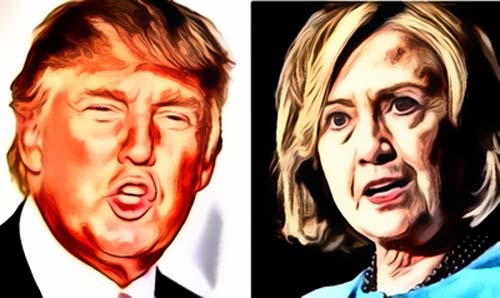
To an outsider, the biggest question of the 2016 U.S. presidential election may be how the country came to be stuck with such an imperfect field of candidates. Higher percentages of potential voters view the front-runners, Hillary Clinton and Donald Trump, unfavorably than favorably. The net favorability ratings of the current field are the lowest in recent history.
A popular explanation is that people are fed up with politics as usual, but even the candidate who has done better than others at riding this discontent -- Trump -- is disliked by most voters.
I have my own theory: Over time, U.S. presidential elections have evolved into a sports event, and that has affected the self-selection of candidates.
Americans are obsessed with sports, particularly with statistics. Soccer fans in Europe and Latin America care far less about players' and teams' stats than do baseball and football fans. That carries over to politics, producing superstitions such as the "Redskins Rule" (if the Washington Redskins lose in their final home game before the presidential vote, the incumbent will lose).
Serious science has also increasingly treated politics as sports. In 2012, the political scientist John Sides of George Washington University explained that he derived approach to research from baseball, specifically from Michael Lewis's "Moneyball," in which a baseball manager abandons the "gut feeling" school of selecting players and starts relying exclusively on arcane but important statistics. Sides wrote:
"My goal with the study of elections is to move things as close as possible towards 'Moneyball,' which is to say I want to measure what's going on, I want to measure the background conditions and the fundamentals that are important in any election, like the economy. I want to measure the news coverage, I want to measure the campaign advertising, all of the things that convey information to the voters about the candidates, and then finally I want to measure the voters themselves, I want to understand why they made the choices they did and what impact, if any, the campaign had."
During the 2008 campaign, a similar philosophy brought national fame to the statistician Nate Silver, founder of the FiveThirtyEight blog, who specializes in numerical analysis of politics and baseball. He's still riding high, having accurately predicted the outcome of the 2012 election in 49 states.
The inevitable result of numerical analysis is that candidates are measured, and measure themselves, according to a set of metrics. That's the bread and butter of U.S. political consultants, who are known for their ability to play "moneyball." Some, like political scientist Keena Lipsitz, argue that the sports-like approach may work well for U.S. politics. In her 2011 book, "Competitive Elections and the American Voter," she wrote:
"The most appealing aspect of the sports metaphor, however, is that it suggests that the best way to engage voters is to give them a competitive, fair fight. Few people want to watch a game where the teams are unevenly matched and the outcome is likely to be a 'blowout,' so competitiveness is crucial."
The news media does its best to persuade its audience that this is a competitive event, feeding the public sports-like detail on polls, fundraising and endorsements. Silver, for example, gives Clinton an 80 percent chance of beating Bernie Sanders in Iowa, but pundits and political reporters see an increasingly close race.
Journalists are an interested party. Although no one I have pestered during my first week in the U.S. covering the campaign would give me even odds on a Clinton defeat, we need to cultivate suspense about the outcome. Arguably, this helps make the voting more representative by raising the voter engagement that Lipsitz discussed.
The ultra-competitive atmosphere both we and the political scientists of the number-crunching school have helped to create appears, however, to have modified the political genome. It has bred scrappy, combat-ready candidates. There even is a ranking of how well they would do in a bar fight (Clinton topped this decidedly partisan list, and I think Trump deserved much better than 13th place).
The more campaigning is about competing in the strict, athletic sense, the more it favors the less likable contenders. They have to survive in an increasingly harsh, pitiless event. This is less about sincerity -- something for which Trump and Sanders supposedly score high -- than about punch and stamina.
This election is starting to resemble a gladiatorial contest, judging by the tough polemics in both camps and the low favorability ratings. Perhaps it's time to take a close look at the rules. A campaign spending cap might help, and so might a limit on political advertising, such as those in some European countries. If campaigns weren't such relentless, expensive spectacles, they might be less about athletics and more about substance, and more appealing personalities might become interested in participating.
Comment by clicking here.
Leonid Bershidsky, a Bloomberg View contributor, is a Berlin-based writer.



 Contact The Editor
Contact The Editor
 Articles By This Author
Articles By This Author